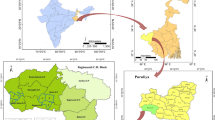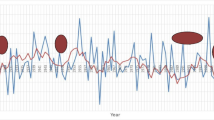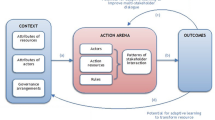Abstract
The main goal of this study is to evaluate the application of participatory approaches in the planning of drinking water supply (DWS) and basic sanitation (BS) projects in rural communities of Colombia. Information was collected through interviews with experts, official and scientific publications. The analysis utilized qualitative methodologies (coding, integration, and triangulation of information) and the Business Model Canvas (non-profits). The results show the adopted different participatory approaches in the planning of the same kind of projects. In addition, the results suggest that the use of these methodologies in the planning of the projects allows the selection of technologies that adapt to the cultural, social and economic conditions of the beneficiary communities; it also generates a sense of belonging, and systems ownership, which results in their sustainability. However, the results indicate that institutional, social, financial, technical and political aspects limit its application. The analysis showed for the effective incorporation of participatory approach (PA) in the planning of DWS and BS in Colombia is necessary to define guiding instruments for the planning and development of participatory processes, to strengthen capacities of the professionals in charge of project planning, local governments and communities; and allocation of the financial resources to carry out the processes.
Similar content being viewed by others
References
ADB (2012) The saemaul undong movement in the Republic of Korea. Sharing knowledge on community-driven development. Asian Development Bank, Mandaluyong City, Philippines
AECID (2015) Guía de la AECID para la sostenibilidad y modelos de gestión de los sistemas rurales de agua potable. The Spanish Agency for International Development Cooperation, Madrid, España
Bakalian A, Wakeman W, Locussol A, Verspyck R (2009) Post-construction support and sustainability in community-managed rural water supply: Case studies in Peru, Bolivia, and Ghana. Water Sector Board discussion paper series No. 14, World Bank, Washington, DC, USA
Bergold J, Thomas S (2012) Participatory research methods: World bank. Forum Qualitative Sozialforschung / Forum: Qualitative Social Research 13(1), DOI: https://doi.org/10.17169/fqs-13.1.1801
Carrasco W (2011) Políticas públicas para la prestatión de los servicios de agua potable y saneamiento de las áreas rurales. Comisión Económica para América Latina y el Caribe (CEPAL), Santiago, Chile
Clark M, Sartorius R, Bamberger M (2004) Seguimiento y evaluación: instrumentos, métodos y enfoques. Evaluation Capacity Development Working Paper Series, ECD, World Bank, Washington, DC, USA
Cornwall A (2008) Unpacking ‘participation: models’, meanings and practices. Community Development Journal 43(3):15
DANE (2016) Encuesta nacional decalidad de vida 2016. Departamento Nacional de Estadtica, Retrieved August 1, 2017, http://www.dane.gov.co/index.php/estadisticas-por-tema/salud/calidad-de-vida-ecv/encuesta-nacional-de-calidad-de-vida-ecv-2016
Díaz-Díaz R Muñoz L, Pérez-González D (2017) Business model analysis of public services operating in the smart city ecosystem: The case of SmartSantander. Future Generation Computer Systems, 76:198–214, DOI: https://doi.org/10.1016/j.future.2017.01.032
DNP (2014a) Misión para la transformación del campo: Definición de categorías de ruralidad. Departamento Nacional de Planeación, Bogotá D.C., Colombia
DNP (2014b) Policy for the supply of drinking water and basic sanitation in rural areas. Document CONPES 3810, Departamento Nacional de
Planeación, Bogotá D.C., Colombia Ducci J, Cotón X (2014) Marco sectorial para actuatión del BID en agua potable y saneamiento rural. Inter-American Development Bank, Washington, DC, USA
Edgerton J, McClean K, Robb CPS, Tikare S (2000) Procesos participativos en la Estrategia de Lucha contra la Pobreza. World Bank, Washington, DC, USA
Enéas da Silva FO, Heikkila T, de Souza Filho FdA, Costa da Silva D (2013) Developing sustainable and replicable water supply systems in rural communities in Brazil. International Journal of Water Resources Development 29(4):622–635, DOI: https://doi.org/10.1080/07900627.2012.722027
Furber A, Medema W, Adamowski J, Clamen M, Vijay M (2016) Conflict management in participatory approaches to water management: A case study of lake ontario and the St. Lawrence River Regulation. Water 8(7):280, DOI: https://doi.org/10.3390/w8070280
GNC (2016) Acuerdo final para la terminatión del conflicto y la constructión de una paz estable y duradera. Acuerdo Final, GNC, FARC-EP y países garantes, La Habana, Cuba
Hare M, Krywkow J (2005) Participatory processes for the design of water storage areas. Seecon Technical Report No. 01/2005 for the TRUST project, Seecon Deutschland GmbH, Osnabruck, Germany
Krywkow J, Hare M (2008) Participatory process management. Proceedings of iEMSs 2008: International congress on environmental modelling and software, July 7–10, Barcelona, Spain
Laouris Y, Emiliani P-L, Roe P (2017) Systemic evaluation of actions toward developing practical broadband applications for elderly and people with disabilities. Universal Access in the Information Society 16(1):247–255, DOI: https://doi.org/10.1007/s10209-015-0441-0
Maya D, Pérez E, Farah M (2002) Metodologías en la formulatión y planificación de proyectos de desarrollo rural Cuadernos de Desarrollo Rural. Pontificia Universidad Javeriana Bogotá, Bogotá, Colombia
Mostert E (2003) Public participation and the European water framework directive — A framework for anal inception report of the HarmoniCOP project — Harmonising Collaborative Planning, RBA Centre, Delft University of Technology, Delft, Netherlands
Muraleedharan K (2005) Participatory rural development: Some observations on the reality and rhetoric of participation from real world experiments. NIRD Foundation Day Seminar: Rural Development and Social change, National Institute of Rural Development, New Delhi, India
MVCT (2016) Decree 1898. Por el cual se adiciona el Título 7, Capítulo 1, a la Parte 3, del Libro 2 del Decreto 1077 de 2015. Bogotá, D.C., Colombia
Ndaw MF (2016) Private sector provision of water supply and sanitation services in rural areas and small towns: The role of the public sector. World Bank, Washington, DC, USA
Osterwalder A, Pigneur Y (2010) Business model generation. John Wiley and Sons Inc., Hoboken, NJ, USA, 288
Pretty J (1995) Participatory learning for sustainable agriculture. World Development 23(8):1247–1263
Rabinowitz P (n.d.). (2017) Capítulo 18. Decidir dónde comenzar. Seccion Principal, Community Tool Box, Retrieved August 1, 2017, http://ctb.ku.edu/es/tabla-de-contenidos/analizar/donde-empezar/enfoques-participativos/principal
Rammelt CF (2014) Participatory action research in marginalised communities: Safe drinking water in rural bangladesh. Systemic Practice and Action Research 27(3):195–210, DOI: https://doi.org/10.1007/s11213-013-9280-1
RED (2017) National network of community aqueducts of Colombia. Retrieved August 1, 2017, http://redacueductoscomunitarios.co/
Rojo T, Maestre J (2010) Sevilla: Equipo de investigatión “Desarrollo y cambio social”. Departamento de Sociología, Universidad de Sevilla, Sevilla, Spain
Rubin H, Rubin I (1995) Qualitative interviewing: The art of hearing data, Sage Publications, London, UK
WB (2017) Participation & civic engagement — Participation at project, program & policy level. World Bank, Retrieved August 1, 2017, https://web.worldbank.org/WBSITE/EXTERNAL/TOPICS/EXTSOCIALDEVELOPMENT/EXTPCENG/0,,contentMDK:20507658~menuPK:410312~pagePK:148956~piPK:216618~theSitePK:410306,00.htm
White SC (1996) Depoliticising development: The uses and abuses of participation. Development in Practice 6(1):6–15, DOI: https://doi.org/10.1080/0961452961000157564
Zabala N (2017) Diccionario de Acción Humanitaria. Retrieved August 1, 2017, http://www.dicc.hegoa.ehu.es/listar/mostrar/89
Acknowledgements
This work was supported by Korea Environment Industry & Technology Institute (KEITI) though Water Management Research Program, funded by Korea Ministry of Environment (MOE) (79608). The authors gratefully acknowledge the Global Environment Scholarship Program (GESP) of The Korea Environmental Industry and Technology Institute (KEITI); also thank to the experts for their contributions.
Author information
Authors and Affiliations
Corresponding author
Rights and permissions
About this article
Cite this article
Rossio, C.P.Y., Seo, Y. Participatory Approaches in the Planning of Drinking Water Supply and Basic Sanitation Projects in the Rural Areas of Colombia. KSCE J Civ Eng 24, 1374–1382 (2020). https://doi.org/10.1007/s12205-020-1091-1
Received:
Accepted:
Published:
Issue Date:
DOI: https://doi.org/10.1007/s12205-020-1091-1




